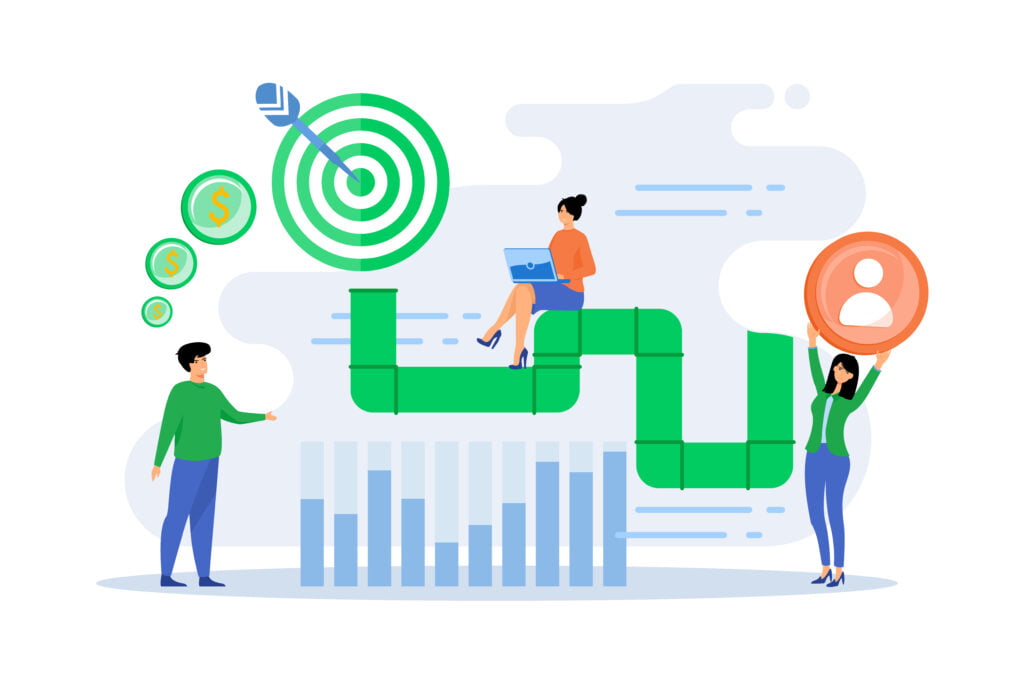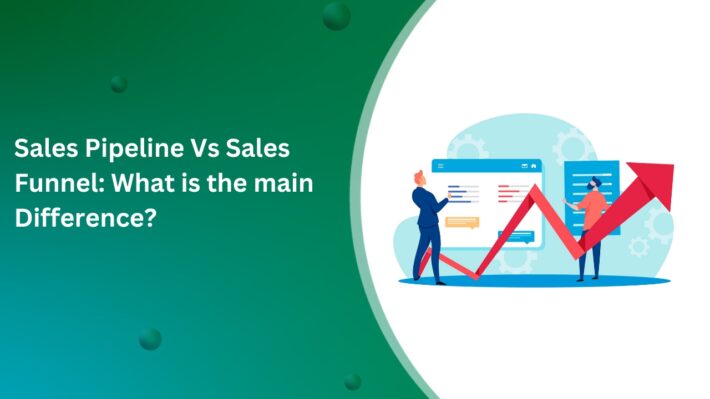What is Sales Pipeline Management | Complete Guide 2025

Ever question how the best sales teams manage to meet their goals on a regular basis? A well-managed sales pipeline may hold the key, easier than you might imagine. Although you may hear the term “sales pipeline” tossed around in the sales community, it’s more than just industry slang; it’s a strong tool that can transform your sales process and increase your revenue.
At its core, a sales pipeline is a visual representation of your sales journey. It maps out the steps a potential customer takes from first contact to closing the deal. By breaking down this journey into clear stages, you gain invaluable insights into your sales process. You’ll see where deals are flowing smoothly, where they’re getting stuck, and which activities are most effective in moving prospects towards a purchase.
In this blog, we’ll demystify the concept of sales pipelines. We’ll explore why they’re crucial for sales success, break down the typical stages, and show you how to build and manage your own pipeline. Whether you’re new to sales or looking to refine your approach, understanding sales pipelines could be the key to unlocking your team’s full potential.
What is a Sales Pipeline management?
Key components of a sales pipeline include:
- Leads: Potential customers who have shown interest in your product or service.
- Prospects: Leads that have been qualified and show a higher likelihood of becoming customers.
- Opportunities: Prospects that are actively engaged and considering a purchase.
- Customers: Prospects who have made a purchase and become paying customers.
While often confused with a sales funnel or sales pipeline Let’s understand it quickly!
Difference between a Sales pipeline and Sales funnel
| Sales Pipeline | Sales Funnel |
|
|
|
|
|
|
|
|
|
|
The main difference is in perspective and purpose. A sales pipeline is a tool for sales teams to manage their deals and process, while a sales funnel is more about understanding and optimizing the customer’s decision-making journey.
👉 Read to know more about: what is Sales Funnel
For example, a sales pipeline might have stages like “Initial Contact,” “Qualification,” “Proposal,” and “Negotiation.” A sales funnel, on the other hand, might have stages like “Awareness,” “Interest,” “Consideration,” and “Decision.”
Sales managers often use both concepts together: the funnel to understand how leads are converting, and the pipeline to manage the actual sales process and forecast revenue. Now you understand the difference between a sales funnel and a sales pipeline. Let’s move on to
Why a Sales Pipeline is Important for Any Business?
A sales pipeline is crucial for any business because it helps organize and manage the sales process effectively. Here are the key reasons why it’s important:
Organizes Sales Activities: A sales pipeline breaks down the sales process into clear stages, making it easier to manage and track progress.
Improves Lead Management: It helps you keep track of potential customers, ensuring no lead is overlooked and increasing the chances of conversion.
Enhances Forecasting: By visualizing the pipeline, businesses can predict future sales and revenue more accurately.
Increases Efficiency: Identifying bottlenecks and areas for improvement in the sales process allows for more efficient operations.
Boosts Team Performance: Sales teams can focus on the most promising leads, work more strategically, and close deals faster.
Provides Insights: Analyzing the pipeline data offers valuable insights into customer behavior and sales trends, helping to refine strategies.

What are the stages of a sales pipeline?
The stages of a sales pipeline represent the steps a potential customer goes through from the moment they are identified as a lead to the point they become a paying customer. Understanding these stages helps sales teams manage their activities effectively and close more deals. Let’s break down each stage in detail:
1. Lead Generation
Lead generation is the first stage of the sales pipeline. Here, you identify potential customers (leads) who might be interested in your product or service. This can be done through various methods such as:
- Online marketing (Facebook & google ads)
- Website visitors (SEO, content marketing)
- Networking events
- Referrals
- Email campaigns
The goal at this stage is to attract as many leads as possible to fill the top of the pipeline.
2. Lead Qualification
Once you have a list of leads, Lead Qualification helps you determine which leads are worth pursuing. This involves assessing each lead to see if they match your ideal customer profile. Factors to consider include:
- Budget: Can the lead afford your product or service?
- Needs: Does the lead have a problem your product can solve?
- Authority: Is the lead a decision-maker or influencer within their organization?
- Timeline: Is the lead ready to make a purchase soon?
Qualified leads move on to the next stage, while unqualified leads may be nurtured for future opportunities.
3. Initial Contact
In the Initial Contact stage, your sales team reaches out to the qualified leads. This can be done through:
- Phone Calls: Direct conversations to introduce your product or service.
- Emails: Personalized emails to spark interest and provide more information.
- Social Media: Connecting with leads on platforms like LinkedIn.
The aim is to establish a relationship and gather more information about the lead’s needs and interests.
4. Sales Presentation
The Sales Presentation stage involves a detailed demonstration of your product or service tailored to the lead’s specific needs. This can include:
- Live Demos: Showing the product in action.
- Slide Decks: Highlighting key features and benefits.
- Case Studies: Providing examples of how your product has helped other customers.
The goal is to convince the lead that your solution is the best fit for their needs.
5. Proposal/Quote
After a successful presentation, the next stage is to provide a Proposal or Quote. This document outlines:
- Pricing: Detailed cost breakdown.
- Terms and Conditions: Payment terms, delivery timelines, and other contractual details.
- Scope of Work: What is included in the service or product offering.
A clear and well-structured proposal helps set expectations and moves the deal closer to closing.
6. Negotiation and Commitment
In the Negotiation and Commitment stage, the lead and your sales team discuss the terms of the proposal. This may involve:
- Price Adjustments: Offering discounts or flexible payment plans.
- Contract Terms: Negotiating delivery schedules, service levels, or additional features.
- Commitment: Securing a verbal or written agreement to move forward.
Successful negotiations lead to a formal commitment from the lead to purchase.
7. Closing the Deal
The Closing the Deal stage is where the lead officially becomes a customer. This involves:
- Finalizing Contracts: Signing the necessary legal documents.
- Processing Payment: Handling invoicing and payment collection.
- Onboarding: Starting the process of delivering the product or service.
This stage marks the successful conversion of a lead into a paying customer.
8. Post-Sale Follow-Up
The sales process doesn’t end with closing the deal. The Post-Sale Follow-Up stage is crucial for ensuring customer satisfaction and fostering long-term relationships. Activities include:
- Customer Support: Providing assistance with product usage or issues.
- Feedback Collection: Gathering customer feedback to improve your offerings.
- Upselling and Cross-Selling: Introducing additional products or services that may benefit the customer.
- Relationship Building: Maintaining regular contact to nurture the relationship and encourage repeat business.
Effective post-sale follow-up can lead to customer loyalty and referrals, further fueling your sales pipeline.
These stages form the backbone of a successful sales pipeline, helping you manage your prospects effectively and close more deals. Using a tool like SalesTown CRM can streamline these stages, ensuring that your sales process is efficient and productive.
Why a Sales Pipeline is Crucial for Your Business
A well-structured sales pipeline is essential for any business. It provides a clear framework for managing and tracking sales and lead activities, helping you stay organized and focused on closing deals.
Here are some key benefits of having a structured sales pipeline:
- Improved Sales Forecasting: A clear view of your sales pipeline helps predict future sales and revenue more accurately. You can identify trends and anticipate outcomes based on the current status of deals in the pipeline.
- Better Resource Allocation: By understanding which stages need more attention, you can allocate your resources more effectively. Focus your efforts on high-priority deals and ensure your team is working on the most promising opportunities.
- Enhanced Team Performance: A structured pipeline provides clarity on each team member’s role and responsibilities. This organization improves communication, reduces overlap, and ensures everyone is working towards common goals.
- Increased Conversion Rates: With a well-managed pipeline, you can identify and address bottlenecks quickly. This proactive approach helps move deals through the pipeline faster, leading to higher conversion rates and more closed deals.
As your business grows, a structured pipeline makes it easier to maintain consistency and quality in your sales process.
Build and Manage Your Winning Sales Pipeline with SalesTown CRM
SalesTown CRM empowers you to build a robust and efficient sales pipeline, the backbone of your sales success. Here’s how SalesTown helps you:
- Lead Management: It helps in capturing and organizing leads from various sources, such as website inquiries, social media, and events, into a centralized database.
- Visualize Your Pipeline: SalesTown offers a clear visual representation of your sales pipeline. Drag and drop functionality lets you easily move leads between stages, providing a real-time snapshot of your sales progress.
- Customize Your Stages: SalesTown isn’t a one-size-fits-all solution. Customize the sales pipeline stages to perfectly match your unique sales process, ensuring every step is tracked and optimized.
- Automate Repetitive Tasks: SalesTown automates tedious tasks like sending follow-up emails and scheduling meetings. This frees up your sales reps’ time to focus on building relationships and closing deals.
- Data-Driven Decisions: SalesTown provides powerful reporting and analytics that give you valuable insights into your sales pipeline’s health. Identify bottlenecks, track conversion rates, and make data-driven decisions to optimize your sales strategy.
- Integration Capabilities: It integrates seamlessly with other tools like your website,social media, justdial, indiamart etc. ensuring smooth data flow and comprehensive business management.
With SalesTown CRM, you can build a winning sales pipeline that streamlines your sales process, improves conversion rates, and ultimately drives revenue growth.
Ready to take your sales pipeline to the next level? Try SalesTown CRM today!🤗
Take a free 👉 demo to more know
Some FAQS Related to Sales Pipeline:-
Q. What is a sales pipeline?
A sales pipeline is a visual representation of the sales process, showing the stages a potential customer goes through from initial contact to closing the sale. It helps track and manage leads and opportunities.
Q. What’s the difference between a sales pipeline and a sales funnel?
A sales pipeline focuses on the internal stages your sales team takes prospects through. A sales funnel, on the other hand, represents the broader customer journey, including their initial awareness of your product to the final purchase decision.
Q. What are some best practices for managing a sales pipeline?
- Regularly update your pipeline with new information.
- Set clear expectations for how long leads should stay in each stage.
- Analyze your pipeline data to identify areas for improvement.
- Remove stagnant deals that are unlikely to close.
Q. What tools can be used to manage a sales pipeline?
Effective tools for managing a sales pipeline include CRM software such as SalesTown CRM tools help track interactions with prospects, automate follow-up tasks, and generate reports to monitor pipeline performance.

